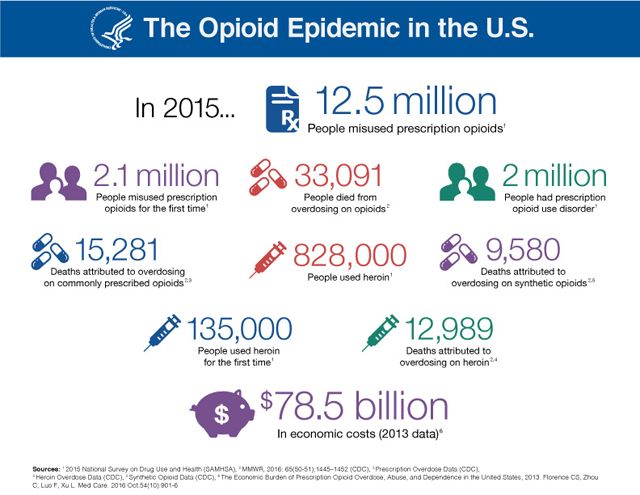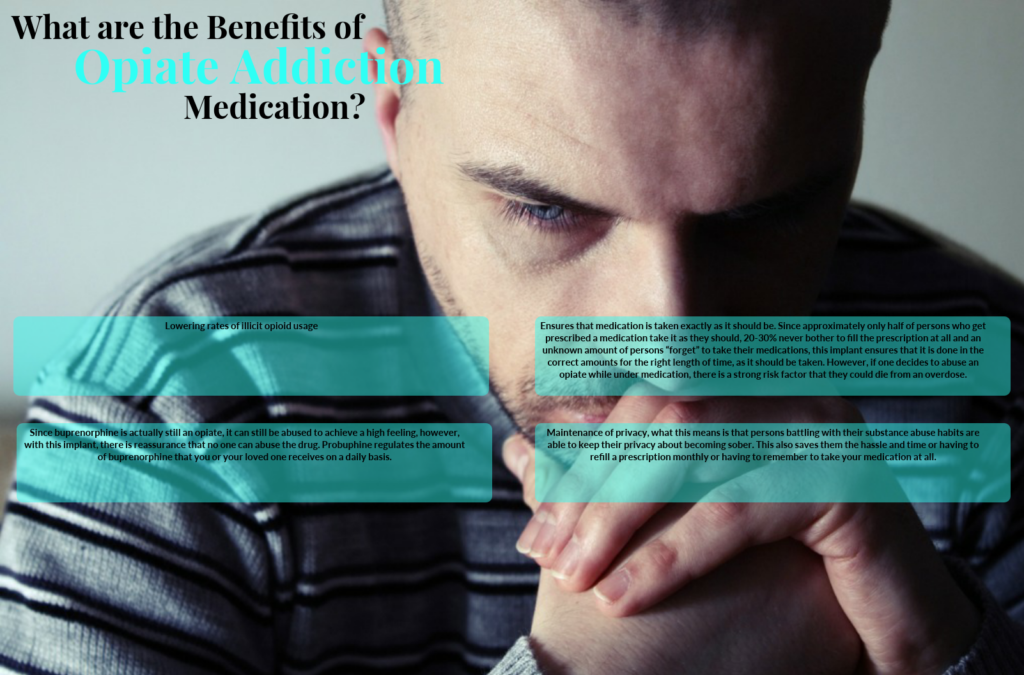New medication for opiate addiction are currently on the market. Opiate addicts now have breakthrough medications to help them with their battle with opiate addiction. FDA has approved new medication for opiate addiction that combined with medically assisted drug rehab can improve the chances of long term recovery. Many health insurance companies such as Blue Cross Blue Shield and Aetna have become very proactive both in reducing the amount of opiate medications being prescribed and supporting new medication assisted treatment for opiate addiction.
New Medication for Opiate Addiction
Opiate addiction has become a significant problem in America today. It is estimated that over 64,000 overdose deaths occurred as a result of opiate-related overdoses.

Health and Human Services (HHS) Opioid Epidemic
Medication for Opiate Addiction
What helps with withdrawals from opiates?
From our experience medications for opiate addiction, such a Probuphine, Suboxone, Subutex, and Zubsolv work best when under intensive care of medical professionals and clinical staff.
When possible this treatment will occur in a residential substance abuse treatment facility or a controlled intensive outpatient setting.
Opiate addiction is a complicated program often with other underlying issues besides just the physical chemical dependency. As evidence of this we often see opiate addicts removed from the substance and physical withdrawals for a period of weeks or months only to return to their opiate of choice.
Many that suffer from opiate addiction are often in denial or set themselves apart from other addicts and even alcoholics as they are “prescribed” the medication from a doctor. These medications can include Vicodin, Oxycodone, Fentanyl, and Morphine.
Withdrawal Relief
Often with opiate addiction, the medication is prescribed by a doctor for pain from an injury or surgery. In most cases of opiate addiction, we find that over time the drug starts to be abused even with no prior history of substance abuse.
Opiates are extremely powerful substances then when abused dramatically alter a personal habits, behaviors, and brain chemistry.
Opiate addicts who have a goal of freeing himself or herself from this life-threatening bondage and their loved ones who desire to sincerely help them get out of their phase of opioid dependence, many new choices assist in helping you reach that goal.
In fact, the FDA has recently approved the new medication for opiate addiction that will help to relieve symptoms of withdrawal, including an implant that distributes buprenorphine into the bloodstream, with each dosage lasting up to six (6) months.
What medications treat opiate addiction?
Whether you or your loved one are addicted to the same opioid drug, treatment will differ from person to person. The primary goal, however, remains the same, helping you to completely stop the abusing the drug as well as helping you not to relapse after the detox process is over
To get treatment for your opiate addiction, you may be prescribed certain medications to help lessen the effects of your withdrawal symptoms and also assist in controlling the cravings.
Probuphine, New Medication for Opiate Addiction Cure
Is there a cure for opiate addiction
Probuphine is an implant that provides a constant supply of buprenorphine to opioid addicts. This implant is a matchstick shaped one (1) inch rod of which four (4) are inserted into the upper arm by a trained physician, given to the addict during an outpatient visit, every six (6) months.
While buprenorphine is not a new drug, it is the first time that an implant to treat opioid addiction has been approved by the FDA. Ironically, buprenorphine acts on the same receptors within the brain that opioids do.
Buprenorphine does not produce the same effects or euphoric feeling, and it provides a non-dependent result which makes the user not crave for the same high emotion at the same extent that they once did.
Benefits of Medication for Opiate Addiction
What are the benefits of opiate addiction medication?
As with everything else in life, there is an upside, and there is a downside. Now let us take a minute to understand the benefits of which this new medication for opiate addiction provides you and your loved one with.
-
Lowering rates of illicit opioid usage.
-
Ensures that medication is taken exactly as it should be.
Since approximately only half of persons who get prescribed a pill take it as they should, 20-30% never bother to fill the prescription at all and an unknown amount of persons “forget” to take their drugs, this implant ensures that it is done in the correct amounts for the right length of time, as it should be taken. However, if one decides to abuse an opiate while under medication, there is a substantial risk factor that they could die from an overdose. - Since buprenorphine is still an opiate, it can even be abused to achieve a high feeling; however, with this implant, there is reassurance that no one can abuse the drug. Probuphine regulates the amount of buprenorphine that you or your loved one receives on a daily basis.
- Maintenance of privacy, what this means is that persons battling with their substance abuse habits can keep their confidentiality about becoming sober. This also saves them the hassle and time or having to refill a prescription monthly or having to remember to take your medication at all.
Opiate Addiction Medication – Zubsolv
What is Zubsolv?
Zubsolv is the result of a combination of buprenorphine and naloxone; both are considered medication for opiate addiction. How it works is that naloxone blocks the effects of the opioid drug, including pain relief or feelings of well-being that can lead to opioid, contradicting the effects of buprenorphine.
Zubsolv is a menthol flavored tablet that dissolves under the tongue. Similar to other opioid treatments, the use of Zubsolv is accompanied by psychosocial support and counseling. However, unlike the other opioid addiction treatments, the patient will be required to take much less of the drug to achieve the desired result.
Opiate Addiction Medication – Lofexidine Hydrochloride
This non-narcotic, non-addictive medication for opiate addiction which helps in lessening the effects of an opioid addicts withdrawal symptoms. to works by suppressing the release of adrenalin within the body resulting in reduced withdrawal symptoms. This drug, however, does not lessen the craving for the opioid that you or your loved one is addicted to.
Opiate Addiction Medication – Naltrexone
What is Naltrexone
Naltrexone has recently been added to the list of non-narcotic treatments to help cure opioid and alcohol addictions. This drug works by blocking the that opioids pose on its abuser. However, it does not reduce the cravings for opioids.
Naltrexone is injected into its patient once each month in order to prevent a relapse after the detoxification phase.
Opiate Addiction Medication – Methadone
What is methadone?
Methadone is an opioid medication used for several decades to treat withdrawal symptoms. This medication for opiate addiction was usually prescribed to treat heroin addicts.
Methadone is a long acting opiate which extends the withdrawal process. Many addicts have reported that they are able to get high on methadone.
Medication for Opiate Addiction – It may not be the cure.
Medication for Opiate Addiction is an important tool, particularly in a medically assisted treatment setting. However, medications for opiate addiction is not the end-all solution.
Taking a pill is not always the answer to fix a complicated “disease” such as opiate addiction.
Intervention and Other Treatment
We recommend contacting one of our professional intervention or the addiction hotline if you or your loved one is struggling with addiction. Our team consists of all walks of life and many of us are former opiate addicts that have dedicated our lives to helping others and their family.
Opiate addiction is a complicated and multifaceted problem consisting of medical, clinical, environmental, and family dynamics that have to be considered.
Opiate addiction is a deadly disease. The truth is that left unchecked opiate addiction will destroy families, careers, and lives.
CBS Reports on new approaches to deal with opiate addiction.
Opiate Addiction – Substance Abuse Treatment Programs
How do I get help for an opiate addiction?
Addicts addicted to powerful opiates such as heroin, oxycodone, methadone, and fentanyl will often need an inpatient drug rehab. Substance Abuse Treatment Centers have specialized programs for Heroin Drug Rehab and opiates.
In certain cases, a Residential Treatment Center may be needed to provide 24/7 monitoring and address medical and mental health issues that may arise from opiate addiction.

